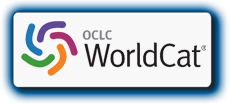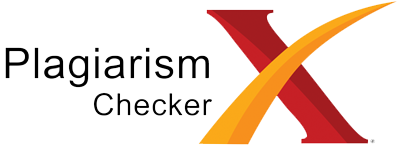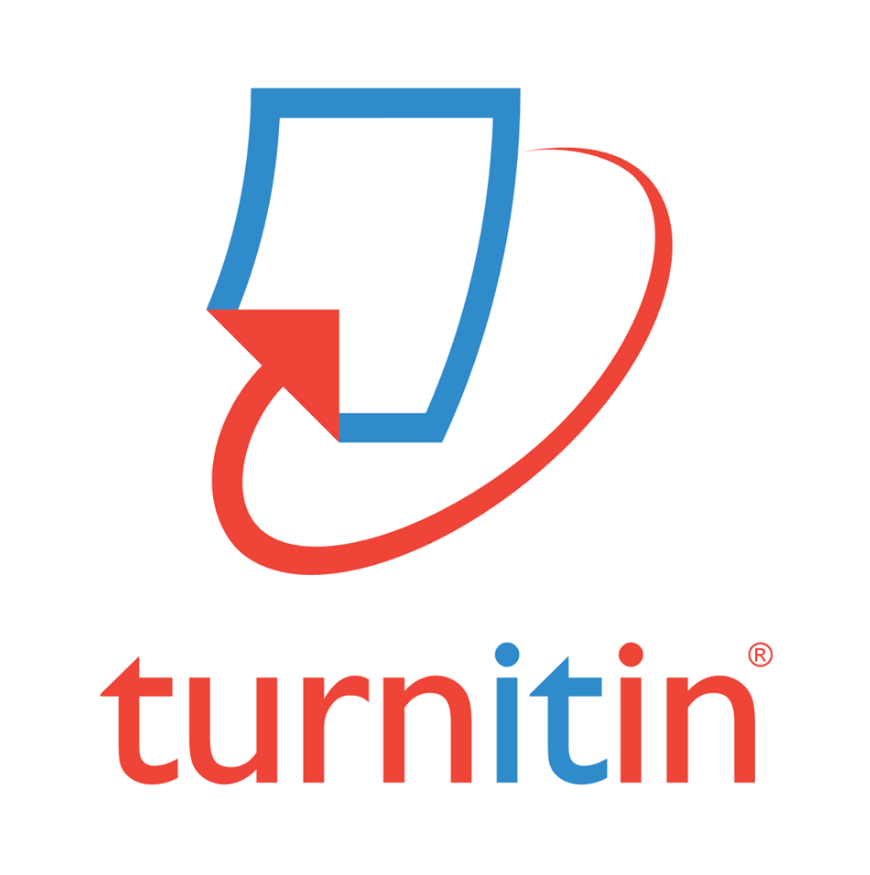Analisis Komparasi Problem Based Learning Dengan Team Assisted Individualization Pada Penguasaan Kompetensi “Mekanisme Katup & Sistem Bahan Bakar” Kelas XI SMK
Abstract
Abstrak: SMK sebagai sekolah vokasi berbeda dengan sekolah menengah umum lainnya. Lebih menekankan pada kompetensi atau keahlian. Pembelajaran yang monoton tidak variatif, membosankan dan lebih banyak terpusat pada guru, menyebabkan tidak efektif dan menyenangka. Penelitian ini menggunakan pendekatan Penelitian Tindakan Kelas (PTK) bertujuan untuk mengetahui bagaimana analisis komparasi PBL dan TAI efektif dalam penguasaan kompetensi “Mentup Simbahkar” akronim mekanisme katup dan sistem bahan bakar pada Pemeliharaan Mesin Sepeda Motor kelas IX. Berdasarkan hasil olah data dapat dilihat: (1). Aktifitas positif pada siklus I sebesar 61%, siklus II sebesar 76%, dan siklus III sebesar 84%, sedangkan aktifitas negatif pada siklus I sebesar 30%, siklus II sebesar 10%, dan siklus III sebesar 10%; (2). Rata – rata kelas pada siklus I sebesar 71, siklus II sebesar 81, dan siklus III sebesar 88, (3). Ketuntasan belajar peserta didik pada siklus I sebesar 28,5%, siklus II sebesar 100%, dan siklus III sebesar 100%.
Abstract: Vocational school as a vocational school is different from other public high schools. Put more emphasis on competence or expertise. Monotonous learning is not varied, boring and is more centered on the teacher, causing ineffective and unpleasant. This study uses a Class Action Research (CAR) approach aimed to find out how the comparative analysis of PBL and TAI is effective in mastering the competence of "Mentup Simbahkar" valve mechanism and fuel system acronyms on Class IX Motorcycle Engine Maintenance. Based on the results of data processing can be seen: (1). Positive activity in cycle I was 61%, cycle II was 76%, and cycle III was 84%, while negative activity in cycle I was 30%, cycle II was 10%, and cycle III was 10%; (2). The average class in cycle I was 71, cycle II was 81, and cycle III was 88, (3). Mastery learning of students in the first cycle of 28.5%, the second cycle of 100%, and the third cycle of 100%.
Keywords
Full Text:
PDFReferences
Anisah, Sumarni, I Komang Astina, 2018, Penerapan Model Pembelajaran Problem Based Learning Dipadu Dengan Team Assisted Individualization untuk Meningkatkan Hasil BelajarSiswa, http://journal.um.ac.id/index.php/jptpp/, Journal Pendidikan, Teori, Penelitian,dan Pengembangan, Volume: 3, Nomor: 2 Bulan Februari Tahun 2018, hal: 159 – 164, Pendidikan Geografi-Universitas Negeri Malang
Agus Ladimiyanto, 2014, Pengaruh Implementasi Pembelajaran Berbasis Masalah dengan Pendekatan Model TAI dan TPS terhadap Hasil Belajar Matematika, http://journal.uny.ac.id/index.php/pythagoras, Pythagoras, Jurnal Pendidikan Matematika, volume 9, nomor 2, hal 110-125
Atika Firda, Mimien Henie Irawati, Siti Imroatul
Maslikah, 2016, Journal-online.um.ac.id,
Universitas Negeri Malang
Berti Dyah Permatasari, Gunarhadi, Riyadi, 2019,
The Influence of Problem Based Learning
Toward Social Science Learning Outcomes
Viewed from Learning Interest,
International Journal of Evaluation and
Reseach in Education (IJERE), Vol. 8, No. 1,
March 2019, pp. 39-46
David J.Edward, Lori Kupczynki, Shannon L. Groft,
, Impact on student Achievment
and Professional Preparation in University
Level Physical Therapy Courses,
International Journal Of Higher Education,
Vol. 8, no.3, June 2019
Dwi Rahdiyanta et al., Characters-Based Collaborative Learning Model: Its Impacts on Students’ Attitude and Achievement, Jurnal Pendidikan Teknologi dan Kejuruan, Volume 23, Nomor 3, Mei 2017, Department of Mechanical Engineering Education, Faculty of Engineering UNY
Ediansyah Ediansyah, Dwi Agus Kurniawan, Rahmat Perdana, Salamah Salamah, 2019, Using Problem-Based Learning in College: Mastery Concepts Subject Statistical Research and Motivation, International Journal of Evaluation and Research in Education (IJERE), Vol. 8, No. 3,
September 2019, pp. 446-454, http://iaescore.com/journals/index.php/IJERE
Hamalik, Omar. 2005. Proses Belajar Mengajar, Jakarta: Bumi Aksara
Karmana, I. W. (2010). Pengaruh Starategi PBL dan Integrasinya dengan STAD terhadap Kemampuan Pemecahan Masalah, Kemampuan Berpikir Kritis, Kesadaran Metakognitif, dan Hasil Belajar Kognitif Biologi pada Siswa Kelas X SMA Negeri 4 Mataram. (Tesis tidak diterbitkan). Pascasarjana Universitas Negeri Malang, Malang.
Maryam Malekigorji, 2019, The Effect of Continued Team Randomization on Student’s Perception and Performance in a Blended Team-Based Teaching Approach, Education Science, Vol. 9 No. 102, May 2019
Meryance V. Siagiaan, Sahat Saragaih, Bornok Sinaga, 2019, Development of Learning Material Oriented on Problem –Based Learning Model to Improved Student’s Mathematical Problem Solving Ability and Metacognition Ability, International Electronic Journal of Mathematic Education, http://doi.org/10.29333/iejme/5717, Vol. 14, No. 2, pp. 331-340
Poikela, E., Nummenamaa., & Anna R. (2006). Understanding Problem Based Learning. Tampere: University of Tempere, Finland. Retrieved from http://www.uta.fi/taju & http://granum.uta.fi.
Sardiman, A. M. 2006. Interaksi dan Motivasi Belajar Mengajar. Jakarta: Grafindo Persada.
Sheeba Sardar Ali, 2019, Problem Based Learning: A Student-Centered Approach, English Language Teaching, Vol. 12, No. 5, April 2019, Pubished by Canadian Center of Science and Education,
http://doi.org/10.5539/elt.v12n5p73
Siti Juleha, Ikmanda Nugraha, Selly Feranie, 2019, The Effect of Project in Problem Based Learning on Students’ Scientifict and information Literacy in Learning Human Excretory System, Journal of Science Learnin, Vol. 2 No. 2, Januari 2019, pp. 33-41
Slavin, R. E. 1994. Educational Psychology: Theories and Practice. Fourth Edition. Masschusetts: Allyn and Bacon Publishers.
Sriyanti, Mustafa, Vernita Sari, Baharullah, 2019, The Implimentation of Mathematical Problem Based Learning as an Effort to Understand the High School Student’s mathematical Thinking Ability, International Education Studies: Vol. 12, No. 2, 2019, Published by Canadian of Science and Education.
Suharsimi Arikunto, 2002. Prosedur Penelitian suatu Pendekatan Praktek. Rineka Cipta. Jakarta
Suharsimi Arikunto, ( 2006). Penilaian Tindakan Kelas. Jakarta: Bumi Aksara
Sudjana, Nana. 2003. Teknologi Pengajaran. Bandung: Sinar Baru Algensindo.
Sudjana, Nana. (2011). Penilaian Hasil Proses Belajar Mengajar. Bandung: PT Remaja Rosdakarya.
Suyitno, Amin. (2010). Pemilihan Model-model Pembelajaran dan Penerapannya di Sekolah. Jakarta: Depag.
Yuberti, Sri Latifah, Adyt Anugerah, Anton Siregar, Misbah, Kittisak Jermsittiparsert, 2019, Approaching Problem Skills of Momentum and Impulse Phenomena Using Context and Problem-Based Learning, European Journal of Educational Research, Vol. 8, No. 4, pp. 1217-1227, http://www.eu-jer.com/
Xiangyun Du, Usama Ebead, Saed Sabah, Jianping Ma, Khalid Kamal Naji, 2019, Engineering Students’ Approaching to Learning and Views on acollaboration: How Do Both Evolve a PBL Environment and What are Their Contributing and Contraining Factors?, Eurasia Journal of Mathematic, Science and Technology Educations,
http://doi.org/10.2933/ejmste/106197,
Vol. 15, No. 11, em1774
DOI: http://dx.doi.org/10.17977/um039v5i12020p088
Refbacks
- There are currently no refbacks.
Copyright (c) 2020 holis saleh harifi

This work is licensed under a Creative Commons Attribution-ShareAlike 4.0 International License.
Edcomtech: Jurnal Kajian Teknologi Pendidikan published by Department of Educational Technology, Faculty of Education, State University of Malang in Collaboration with Asosiasi Program Studi Teknologi Pendidikan Indonesia (APS TPI) and Ikatan Profesi Teknologi Pendidikan Indonesia (IPTPI) with MoU.
Publisher Address:
Lab. Teknologi Pendidikan, Gd.E2, Lt.1
Fakultas Ilmu Pendidikan Universitas Negeri Malang
Jalan Semarang No 5, Kota Malang Kode Pos 65145
Email: edcomtech.fip@um.ac.id
========================================================================================================
| INDEXED BY | TOOLS | PLAGIARISM CHECK | ARTICLE TEMPLATE |
|

Edcomtech is licensed under a Creative Commons Attribution-ShareAlike 4.0 International License.
Edcomtech Statistics (Since July 13th, 2020)

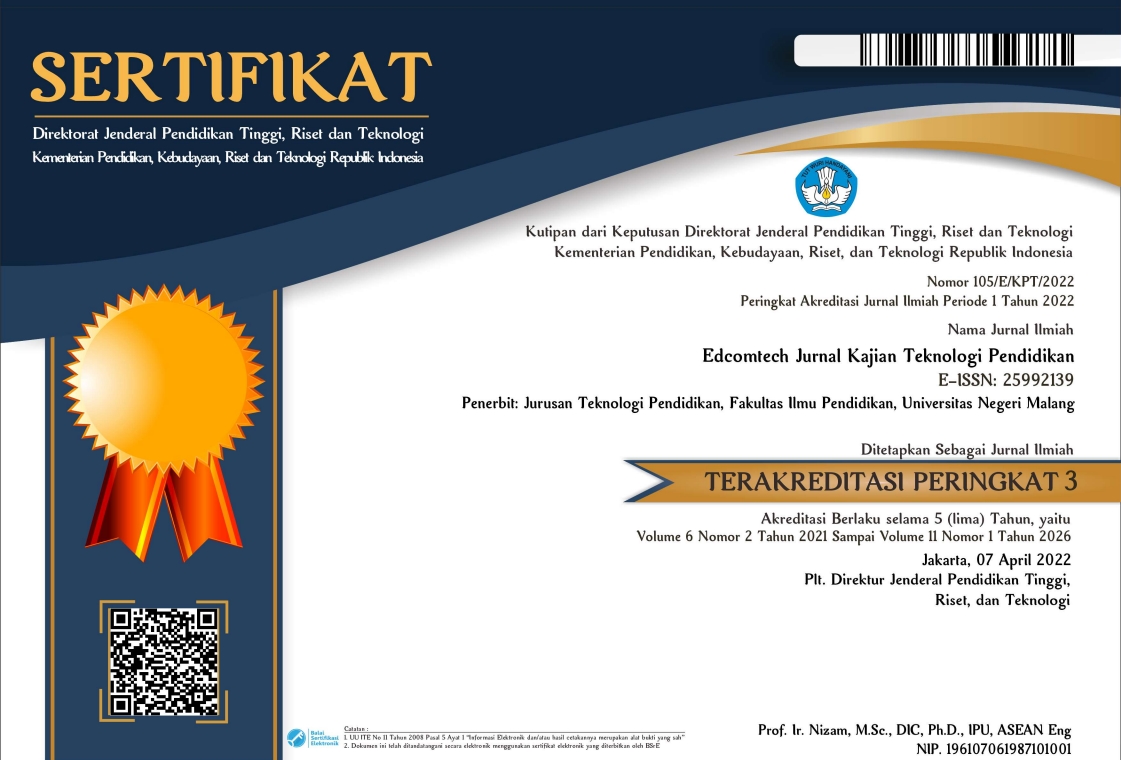



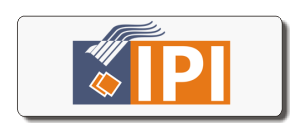





1.png)
